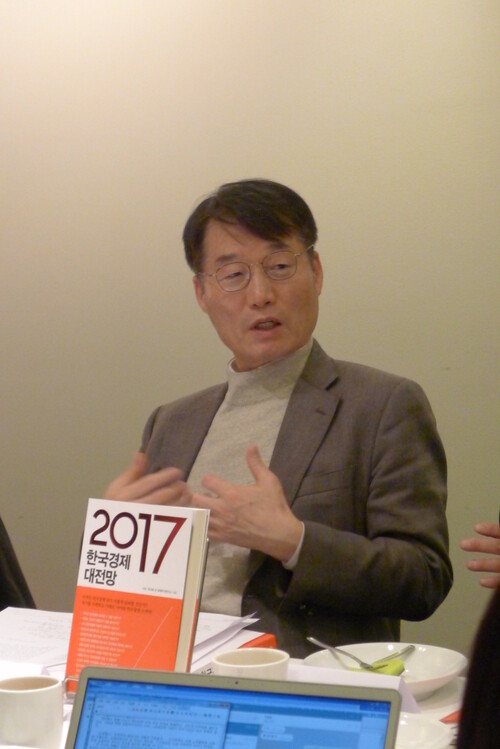hankyoreh
Links to other country sites 다른 나라 사이트 링크
Economists say in 2017, South Korea will enter “long-term low growth conditions”

“Starting in the second half of 2017, the South Korean economy will enter a period of long-term low growth conditions. The year 2017 is the last chance for a crisis-stricken South Korean economy to make constitutional improvements.”
Forty-three economic experts offered a diagnosis and solutions for where a South Korean economy in crisis might go next in a new book titled “2017 Grand Forecast for the South Korean Economy.” They included Seoul National University professor Lee Keun, who has produced a number of research findings on underdeveloped economies catching up with advanced economies, along with Korea Institute of Finance research fellow Jee Man-soo, Chung-Ang University professor Ryu Duk-hyun, Hanshin University professor Park Kyu-ho, and National Assembly Speaker policy aide Lee Jun-hyeop.
“The present situation is a crisis of South Korean capitalism,” Lee Keun told reporters at the Dalgaebi conference house in central Seoul on Nov. 22.
“While the South Korean economy put up a good fight through the early 2010s, there has been a growing sense of crisis in the latter half amid slack performance by mainstay companies like Samsung and Hyundai Motor and political fears about delayed restructuring in shipping and shipbuilding,” he explained.
Lee identified inequality as the root of the economic crisis and argued for a basic income system as a solution, in which sufficient livelihood benefits would be paid to all citizens to keep them out of poverty, regardless of assets, income, or working status.
Likening the South Korean economy to a “broken-down car” that would not benefit from a change in drivers, Lee stressed the urgent need to treat systemic failure.
“Finding new growth engines is going to be difficult under the government’s current approach, which involves simply throwing money at things,” Lee said.
“What we need are things like the bold stock option packages for venture businesses you find in the US, stabilizing management rights by allowing dual-class shares, incentivizing long-term ownership, and encouraging former large corporation employees to start their own businesses,” he suggested.
Lee Jun-hyeop said the South Korean economy “has managed to hold out for the past few years by relying on the government’s revised supplementary budget, interest rate cuts, and encouragement of real estate, but it’s going to hit a wall once the long-term low-growth conditions really begin in the second half of 2017.”
“The year 2017 is going to be the last chance to change the constitution of the South Korean economy,” he predicted.
Lee also said an economic paradigm shift would be a key issue in next year’s presidential election, while advocating efforts to reduce income inequality and promote inclusive growth.
Ryu Duk-hyun predicted economic democratization and shared growth would be major issues in the election.
“Restructuring isn’t an issue limited to a few underperforming industries - it’s something we need across the economy, including both finance and industry,” he said.
With Donald Trump recently elected as the next US President, Lee Keun said the Trans-Pacific Partnership was “a lost cause” and predicted the “end of the FTA era.”
“For China, Trump’s isolationism is a change to really usher in the G2 era, but there is a potential crisis factor that will figure in, namely deepening trade frictions,” he said.
Jee Man-soo predicted constraints on domestic policies linked to the global economy would emerge as prominent, including stronger regulations on overseas corporate activities involving intellectual property rights, law-abiding management, and taxation; the formation of new economic blocs of advanced and emerging economies; and an aggressive stance by the US on exchange rate manipulations by South Korea and China.
By Kwack Jung-soo, business correspondent
Please direct questions or comments to [english@hani.co.kr]

Editorial・opinion
![[Guest essay] Amending the Constitution is Yoon’s key to leaving office in public’s good graces [Guest essay] Amending the Constitution is Yoon’s key to leaving office in public’s good graces](https://flexible.img.hani.co.kr/flexible/normal/500/300/imgdb/original/2024/0416/8917132552387962.jpg) [Guest essay] Amending the Constitution is Yoon’s key to leaving office in public’s good graces
[Guest essay] Amending the Constitution is Yoon’s key to leaving office in public’s good graces![[Editorial] 10 years on, lessons of Sewol tragedy must never be forgotten [Editorial] 10 years on, lessons of Sewol tragedy must never be forgotten](https://flexible.img.hani.co.kr/flexible/normal/500/300/imgdb/original/2024/0416/8317132536568958.jpg) [Editorial] 10 years on, lessons of Sewol tragedy must never be forgotten
[Editorial] 10 years on, lessons of Sewol tragedy must never be forgotten- [Column] A death blow to Korea’s prosecutor politics
- [Correspondent’s column] The US and the end of Japanese pacifism
- [Guest essay] How Korea turned its trainee doctors into monsters
- [Guest essay] As someone who helped forge Seoul-Moscow ties, their status today troubles me
- [Editorial] Koreans sent a loud and clear message to Yoon
- [Column] In Korea’s midterm elections, it’s time for accountability
- [Guest essay] At only 26, I’ve seen 4 wars in my home of Gaza
- [Column] Syngman Rhee’s bloody legacy in Jeju
Most viewed articles
- 1[Column] A death blow to Korea’s prosecutor politics
- 2[News analysis] Watershed augmentation of US-Japan alliance to put Korea’s diplomacy to the test
- 3[Guest essay] How Korea turned its trainee doctors into monsters
- 4‘National emergency’: Why Korean voters handed 192 seats to opposition parties
- 5[Photo] Cho Kuk and company march on prosecutors’ office for probe into first lady
- 6[Column] A third war mustn’t be allowed
- 7[Editorial] New KBS chief is racing to deliver Yoon a pro-administration network
- 8[Editorial] S. Korea should take a note from US-China tactical compromise
- 9[Column] Down with the so-called social ladder
- 10Exchange rate, oil prices, inflation: Can Korea overcome an economic triple whammy?